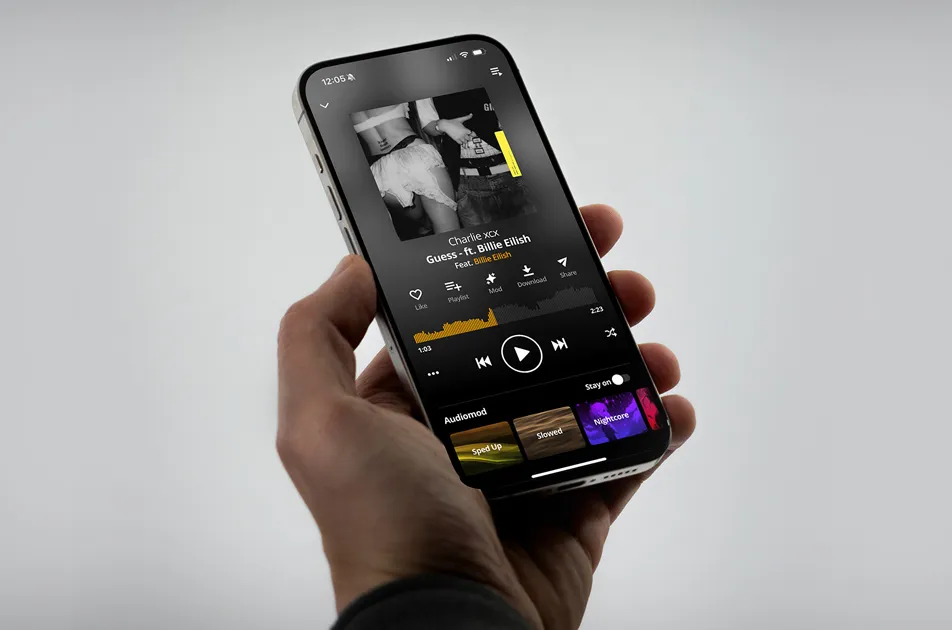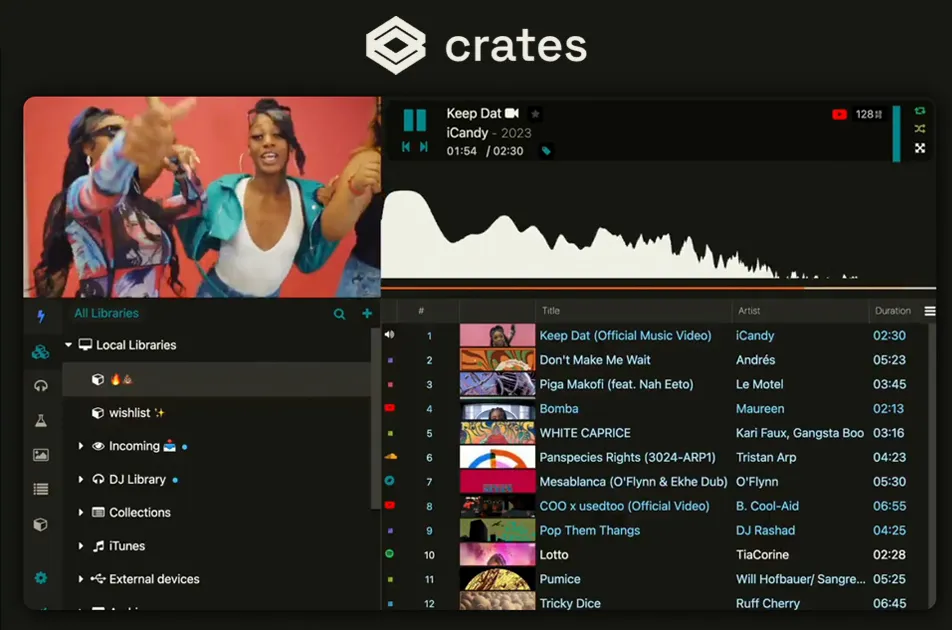This week Evolver.fm intern Connor McKnight offers the latest music app roundup for Apple iOS, Google Android and on the web. His latest picks include iTunes For Android, Smart Guitar and a digital accordion.
- Smart Guitar (free): iTunes contains a bevy of virtual guitar apps, but few make you feel like you’re playing an actual guitar. The biggest problem, inherent to iOS, is the lack of tactile feedback, which makes it all too easy to slide your fingers out of position from the desired chord. Smart Guitar is more forgiving in that respect. It accounts for imperfect positioning on its virtual strings to keep you paying the chord you intended, so you don’t have to stare down at the screen the whole time. Smart Guitar can’t offer a six-string experience, but it adds a hassle-free guitar to your iPhone that lives up to its “smart” billing.
- Songsterr (free, pictured left): If you’re tired of downloading guitar tabs from dodgy sites and hoping they’re worthwhile, consider the Songsterr app, which serves up all the tabs you’ll ever need, without you having to sort the wheat from the chaff. You can search over 300,000 tabs for not just guitar, but also bass and drum instructions for over 70,000 songs, most of which have been peer-reviewed. Each song has one universal tab entry factoring in communally-updated, wiki-style instructions from other members. You can browse the most-viewed tabs by other Songsterr users or browse popular tracks by genre. Legal-eagle readers will be pleased to find that Songsterr pays applicable royalties to songwriters and publishers.
- MusicDNA ID (free): With advancements in audio recognition, the number of capable music ID solutions in the mobile marketplace is growing. MusicDNA ID offers another option for identifying tracks on the go, claiming that even loud environments, like a car or crowded bar, won’t slow their analyzer down. Much like SoundHound or Shazam (or the open-source Echoprint for that matter, from The Echo Nest, publisher of Evolver.fm), the app records a short snippet of the song to give you artist and track data in a matter of seconds. You can identify as many tracks as you like without fear of being charged or asked to upgrade to a paid “premium” version. MusicDNA ID also offers extended song info of each song tagged, including audio analysis of each track and a link to purchase the song on iTunes, if you want to capture it for your own collection.
- Accordion ($1): As we said of Banjo Companion when we covered it a few weeks back, some old-time instruments just don’t stir the pot like they used to (ed. note: the editor would like to state that he defends the banjo). That doesn’t mean you shouldn’t give their digital counterparts a whirl; the entry barrier is after all, decidedly lower. We hadn’t entertained the purchase of an accordion, for instance, or the requisite suspenders to go with it, but this digital imitator seemed like a good way to get our fingers around a polka-ready squeezebox on the cheap. The app’s full-service accordion puts chords on the left of the screen. On the right, you can select the mode: Major or Minor Pentatonic, Harmonic Minor, and even Blues.
- MeloDroid ($1): This app seeks to address an issue plaguing Android users who use iTunes music on a PC: Android phones can’t grab songs directly from iTunes, the way their iPhone does. All is not lost! In fact, MeloDroid and its companion desktop app go beyond the standard iPhone/iTunes sync as it stands today. Not only can you sync your iTunes library to your Android phone, preserving playlists and all, but the app also lets you control iTunes playback remotely, the way Apple’s separate Remote app, which is separate from its iPod app, also can.
- MixZing Media Player (free): This recently-updated entry packs an impressive set of useful features into an all-in-one media player. It displays lyrics and album art; identifies tracks; downloads missing artwork; and cleans up tags for songs with missing metadata. The MixZing player also offers graphic EQ, automated mood-based playlists, and a recommendation engine for finding new artists based on the music you like. The app is also available in a $5 ad-free version.
- Ubuntu One Music (free): For adherents to the Ubuntu One “personal cloud,” online storage locker, this app streams music stored there to your Android phone. Basically, it’s a roll-your-own-yet-full-featured cloud music service, with song caching for offline playback and scrobbling to Last.fm. There is a (slight) catch: Usage of the app requires an Ubuntu One account, which is free up to 5GB, but the app itself requires a paid subscription after 30 days.
- Digitally Imported Radio (free, pictured top): Fans of the dance, house, and trance stations at di.fm will likely appreciate this app, which streams a wide range of electronic music from all over the world on 37 custom programmed stations promising sets from the hottest artists and DJs. Select a station directly or browse by genre in the Styles list to discover new music, and you can favorite anything to check it out later. The app squeezes the best sound quality out of WiFi or cellular data network by adjusting the bit rate.
- Switchr.net (free, pictured): Streaming apps have taken off in the past few years, but many of us still have local music libraries, some of which include file formats that don’t always work. It can be frustrating when the maker of your several-hundred-dollar mobile device decides not to support one. This is where Switchr’s free filetype converter comes in. It converts audio files from and to popular unprotected music formats (AAC, AIF, AU, FLAC, M4A, M4R, MP3 OGG, WAV and WMA), for free, without you having to install any software. Also, M4R is Apple’s default ringtone format, so it can make ringtones quickly from any supported audio sample — nice.
- Waxy’s MP3Calc (free): Okay, this web app didn’t come out this week, or even this year, but it’s incredibly useful if you ever need to figure out how much music, at what bit rate, can fit on a thing. Enter the bit rate (MP3, AAC or whatever — the format doesn’t make a difference) and an amount of disk space, and MP3Calc figures out how many days, minutes, or albums it can fit.




